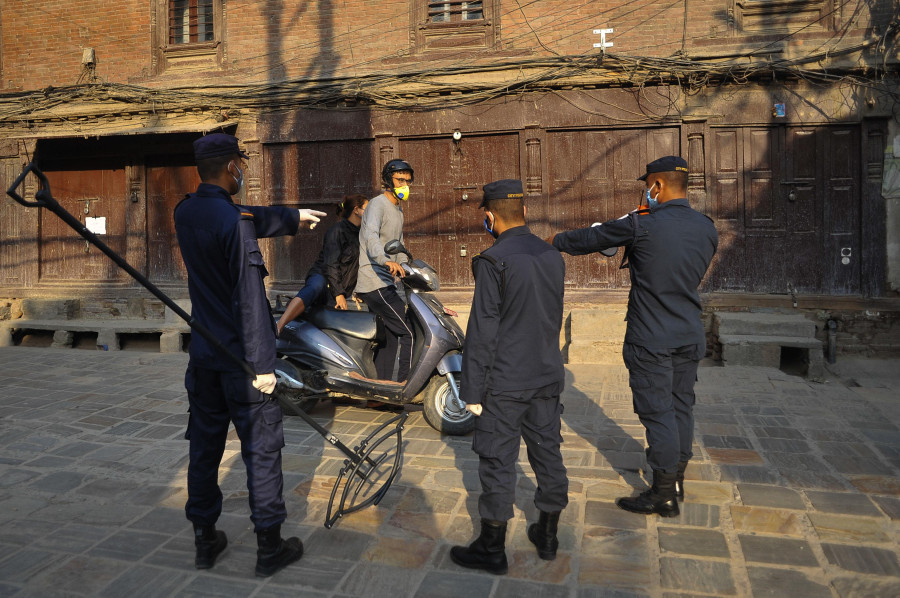National
For citizens out on essential errands, fear of the coronavirus and fear of the police
Images and accounts have recently emerged of Nepal Police personnel overzealously using excessive force against lockdown violators.
Shuvam Dhungana & Pawan Pandey
Ever since the government enforced a nationwide lockdown on March 24 to prevent the spread of Covid-19, numerous images and videos of Nepal Police personnel employing excessive force against violators of the stay-at-home order have emerged. Whether it is assaulting a man on a bicycle or beating up doctors who were returning to their quarters, police personnel have been heavily criticised for their overzealous approach to enforcing the lockdown.
On Thursday and Friday, a new video went viral on social media, once again displaying how quick the police are to employ force. The video, sourced by an online news portal, shows a team of police personnel beating up three people, two women and one man, returning from purchasing medicine. The three can be heard trying to explain that they were out to purchase medicine but once the man in the video begins to get agitated and raise his voice, the police quickly begin to rain batons on them.
“This is not the way to deal with the public. Department should take action immediately, showing brutality to the public could never be right,” one Twitter user wrote.
The incident came to light less than 24 hours after three doctors from Tribhuvan University Teaching Hospital and Kanti Children’s Hospital were beaten by police officers for violating the lockdown, even though they were returning home after their shift ended.
“As part of departmental action, Deputy Superintendent Umesh Lamsal, chief of the Maharajgunj Metropolitan Police Circle, was transferred to the Ranipokhari Metropolitan Police Office,” said Deputy Superintendent Hobindra Bogati, a member of a team formed by the Nepal Police to investigate the incident. “Internal action will be taken against the personnel involved.”
Human rights activists say that the police is using the lockdown as a pretext to employ excessive force against people, even those who have a legitimate reason to be outdoors. The government has said that people can leave their homes to purchase essential goods and for medical reasons.
“Police are carrying out their duties in difficult times and their morale must be boosted, but they cannot go on punishing people in any way they like,” said Mohna Ansari, a member of the National Human Rights Commission.
Ansari also criticised the police’s use of a long clamp-like device to hold lockdown violators while ostensibly maintaining social distancing.
“The use of the device is humiliating,” she said. “The public are not thieves and criminals to be detained in such a way. How can they say they are practising social distancing when they cram all detainees inside a vehicle?”
The government first imposed the lockdown on March 24 and since has extended it three times, with the latest extension applicable until April 27.
As per government instructions, police have also beefed up security in the Capital.
The police have taken action against over 10,000 people in the Valley alone for defying the nationwide lockdown, said Senior Superintendent Shyam Lal Gyawali, spokesperson for the Ranipokhari Metropolitan Police Office.
“As action, they are held for a few hours and then let go,” he said.
Officials at Nepal Police headquarters said that police officers are not allowed to use excessive force on civilians.
“We have instructed our officers to interrogate the offenders first and only take action if they are defying the rules without a valid reason,” said Additional Inspector General Shailesh Thapa Kshetri, also the former spokesperson for the Nepal Police. “But police personnel are working tirelessly to implement the government’s decision with limited resources. During these difficult times, our personnel need support from the public and the media, as they are putting themselves at high risk every day.”
After security personnel courted controversy for using force on citizens, Nepal Police Chief Thakur Prasad Gyawaly directed police officials to present themselves before the public in a modest manner. He summoned three Additional Inspector Generals— Tarini Lamsal, Sailesh Thapa and Hari Bahadur Pal— and chiefs of the Kathmandu, Bhaktapur and Lalitpur police offices and directed them to immediately stop baton-charging the public.
But for many members of the public, the problem is not with the lockdown but the police personnel themselves, who often do not miss an opportunity to use execessive force. Numerous incidents in the recent past have shown that police are prone to mistreating the public and not employing the kind of restraint they should as law enforcement officials.
In February, a video showing a police officer baton charging a woman holding a child in her arms went viral. Last year in December, police baton-charged fans gathered in front of the Dashrath Stadium to watch the South Asian Games football finals. That same month, images emerged of police officers in Kohalpur baton-charging students in school uniforms.
According to Charan Prasain, a human rights activist, using force does not amount to good policing.
“This shows how the law enforcement agency itself is breaking the law,” said Prasain. “Police should try to convince the public first and if they continue to disobey, then the police can take action, which should also be lawful."
Barraged with criticism, the Nepal Police has urged everyone to assist them in enforcing the lockdown and inform them of any mistreatment by security personnel.
The Nepal Police has urged the general public to contact them at the toll-free numbers 100 and 1133, police deployment room at 01-4412780 and 9851283273, complaint investigation at 9851293000, police spokesperson at 9851292111, or email at [email protected] to register any complaints against police personnel.




 16.12°C Kathmandu
16.12°C Kathmandu















